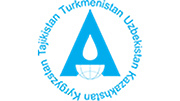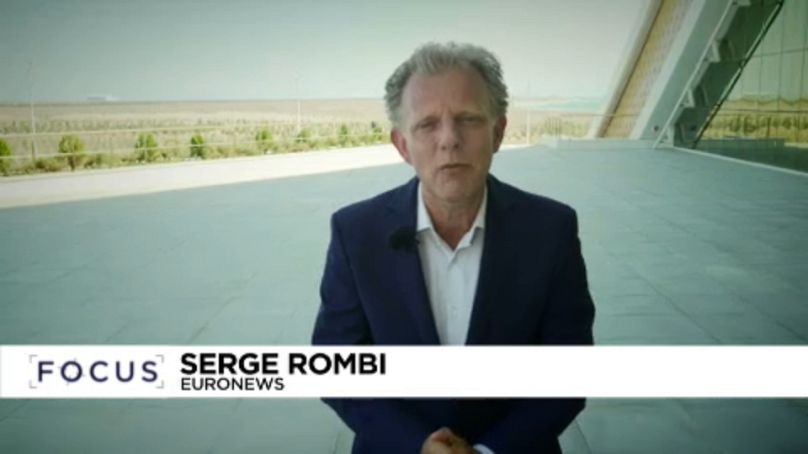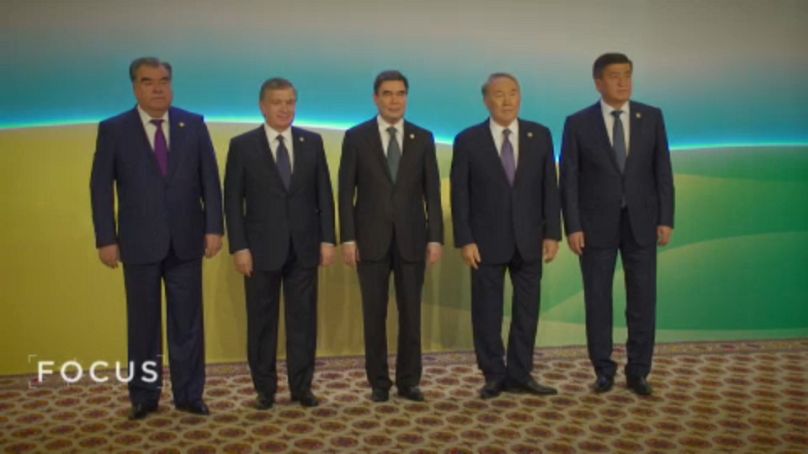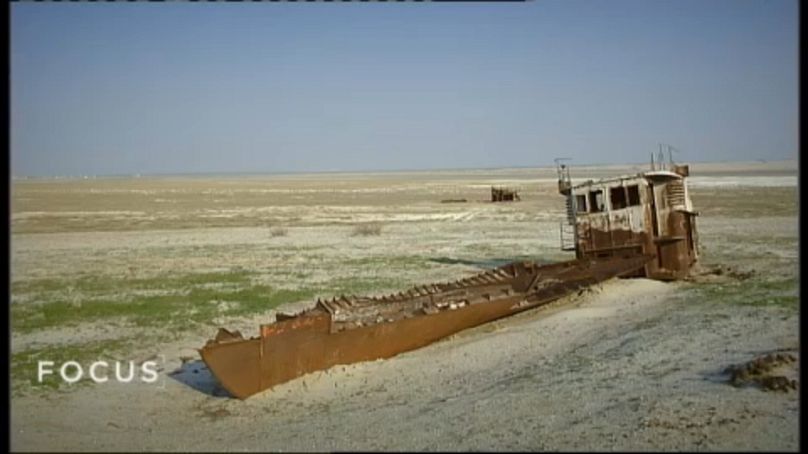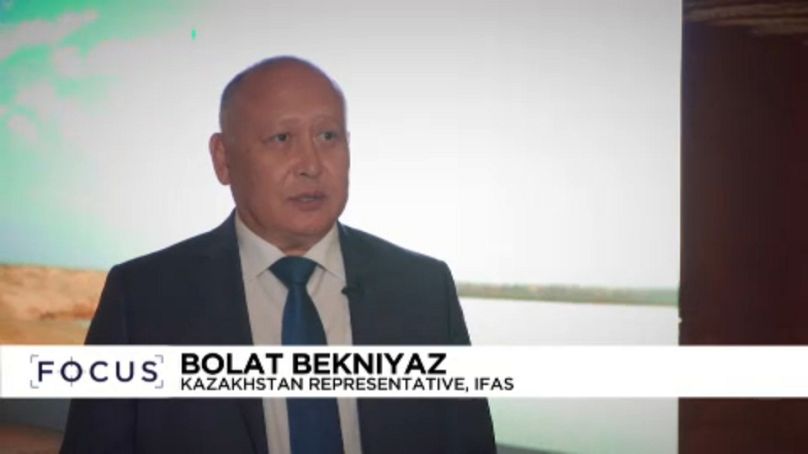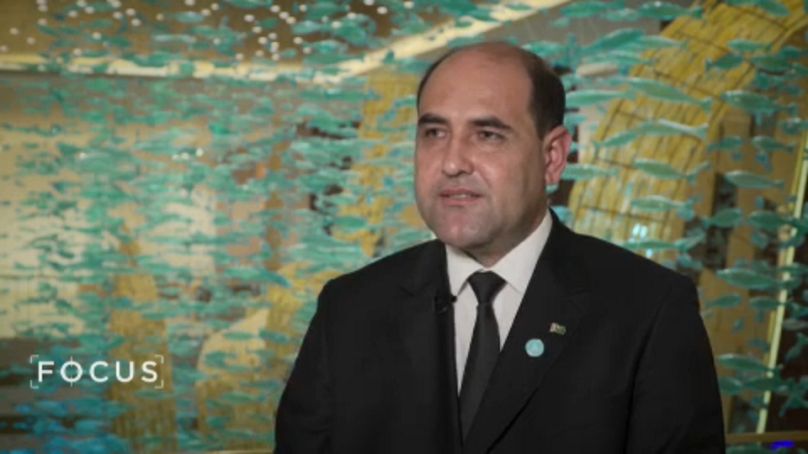Focus takes stock of the situation of the Aral Sea. The subject - from an ecological point of view - is as worrying as that of deforestation in the Amazon. Five Heads of State from Central Asia just met in Turkmenistan to show their common commitment to this huge ecological and economic challenge.
Euronews visited the seaside resort city of Awaza in Turkmenistan, where a crucial summit has just been held on the future of the fast disappearing Aral Sea, which faces huge ecological and economic challenges as its shores have dramatically shrunk in recent years.
The Aral Sea was an endorheic lake -that is one with no outflow- lying between Kazakhstan in the north and Uzbekistan in the south. The name roughly translates as "Sea of Islands", referring to over 1,100 islands that had once dotted its waters.
Formerly one of the four largest lakes in the world, the Aral Sea has been shrinking since the 1960s after the rivers that fed it were diverted by Soviet irrigation projects. By 1997, it had declined to 10% of its original size, splitting into four lakes – the North Aral Sea, the eastern and western basins of the once far larger South Aral Sea, and one smaller intermediate lake. By 2009, the southeastern lake had disappeared and the southwestern lake had retreated to a thin strip at the western edge of the former southern sea; in subsequent years, occasional water flows have led to the southeastern lake sometimes being replenished to a small degree. Satellite images taken by NASA in August 2014 revealed that for the first time in modern history the eastern basin of the Aral Sea had completely dried up. The eastern basin is now called the Aralkum Desert.
GLOBAL ECOLOGICAL CONCERN
The subject of the fast disappearing Aral Sea worries the world, along with deforestation in the Amazon. An ecological and economic challenge that the member countries of the International Fund for Saving the Aral Sea (IFAS) are trying to tackle.
"The creation of the Fund dates back to 1993, but it had been 10 years since such a meeting had taken place," explained Euronews journalist Serge Rombi, who attended at the summit. "Meanwhile, the different member states have of course worked on their side, but the goal of this summit was to revive and reinvigorate joint action. And you will see, from this point of view, it is a success," he said.
For the occasion, the President of Turkmenistan, Gurbanguly Berdimuhamedov, invited the other founding members of the organization: the Presidents of Uzbekistan, Kazakhstan, Kyrgyzstan, and Tajikistan.
"The goal was for heads of state to come together, put their ideas on the table, discuss them, analyze why things are getting worse, and what we need to do to fix the problem," Guyzgeldi Bayjanov, Chairman of the Executive Committee of IFAS, told Euronews.
The problem dates back to the 1960s when the Aral Sea was the fourth largest salt lake in the world. However, in recent decades, it has dried up considerably because of intensive agriculture and irrigation. The sea has lost 90% of its surface, its salinity has exploded and millions of fish have disappeared.
"When the Aral Sea receded, the port cities also disappeared and the people, who were historically linked to the activity of the fish, lost their jobs," said Bolat Bekniyaz, IFAS representative for Kazakhstan.
In an ongoing effort in Kazakhstan to save and replenish the North Aral Sea, a dam project was completed in 2005, with construction financed by the World Bank, helping to bring water back to the north. A true renaissance for this region of Kazakhstan.
"Today we produce 8,000 tons of fish in this region and we have 8 fish processing plants. Part of this fish is exported to Russia and Western Europe," Mr Bekniyaz added.
WORRYING ENVIRONMENTAL CONSEQUENCES FOR BROADER REGION
Further south, a large area has completely dried up. And with the strong winds of this region, the salt and pesticides that are deposited there are spreading in a very worrying way.
For the first time, the phenomenon has even touched Tashkent, the capital of Uzbekistan, which is 500 kilometers away.
"Recently, for 4 days, the atmosphere was covered with saline dust that does a lot of harm, not only to people’s health but also to the harvest," said Mr Bayjanov.
FOUNDATION LAID FOR COMMON STRATEGIC ACTION PLAN
At the summit, member countries made a very important decision, laying the foundation for a new strategic -and above all a common- action plan.
The objective is to further control the use of water. For example, through green technologies to reduce volumes in irrigation. Other ideas have also been mentioned, such as the planting of plant species that are resistant to salt.
"From an ecological point of view, we are trying to make the region greener. For example, by creating a "green belt" at the bottom of the Aral Sea, and around inhabited areas," said Mr Bekniyaz.
At the summit, member countries made a very important decision, laying the foundation for a new strategic -and above all a common- action plan.
The objective is to further control the use of water. For example, through green technologies to reduce volumes in irrigation. Other ideas have also been mentioned, such as the planting of plant species that are resistant to salt.
"From an ecological point of view, we are trying to make the region greener. For example, by creating a 'green belt' at the bottom of the Aral Sea, and around inhabited areas," Mr Bekniyaz added.
Last April, the United Nations, on the initiative of Turkmenistan, adopted a resolution for a cooperation with the Fund for Saving the Aral Sea. A sign that far beyond Central Asia, the international community has taken the measure of the challenge.












